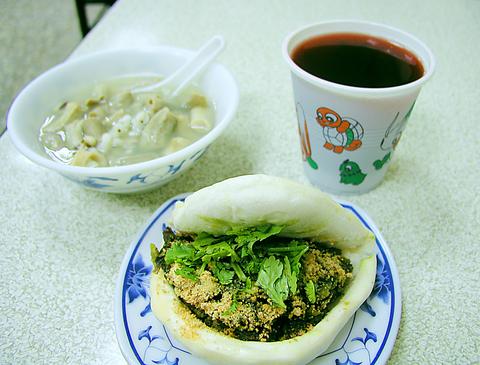Chinese people invented paper, gunpowder and even noodles, according to everyone but the Italians. And it seems Chinese may have also invented the pulled pork barbecue sandwich, a possibility that may raise eyebrows from South Carolina to Texas. But the evidence is there in the gua-bao, a steamed flat bun stuffed with stewed pork, peanut powder and cilantro that has been part of northern Chinese cuisine for centuries.
There are a few stores in Taipei selling this specialty and one of the most popular is the tiny Lan Family Gua-bao near National Taiwan University.
The Lan family eatery offers five versions of the gua-bao that differ in the amount of fat that is stuffed into the bun together with the meat. To experience the full flavor of this delicacy, nothing comes close to the full fatty meat variety. This gua-bao is extravagantly greasy, so diners will be thankful the sandwich is served in plastic wrapping that keeps the fingers from being covered in juices. All the gua-bao cost NT$40 a piece.

PHOTO: MAX WOODWORTH, TAIPEI TIMES
But as tasty as gua-bao are, they don't quite constitute a meal. To fill a hungry stomach, try some of the Lan family's other specialties, like the four spirits soup (四神湯). The soup is a tonic containing hearty, tender snips of pig's intestine and flavored by lotus seeds and barley. This full-bodied dish is overflowing with wholesome nutrients that your body is clamoring for even if your palate disagrees. The alleged tonic power of four spirits soup is most suited for winter weather, so those wary of overheating can opt for the corn and pork rib soup, which is also served hot, but doesn't carry the risk of a chi overload.
The restaurant also serves pig's intestine noodles in a rich and tangy soup that can be given an added zest in its spicy variety. The only rice option at the restaurant is the supremely fragrant tzong-zi (
A sign of the universal appeal of meat wrapped in bread can be seen in the praising notes posted on the walls that were written by diners from around the world who ate the gua-bao. The dozen-or-so messages make up most of the spartan decor in the Lan family's simple and friendly establishment that caters mainly to students from the university across the street. The Kungkuan area is full of cheap eateries, but the Lan Family Gua-bao stands out as a great place for a quick and tasty meal that's a bit different from the regular choice of rice and noodles.

June 2 to June 8 Taiwan’s woodcutters believe that if they see even one speck of red in their cooked rice, no matter how small, an accident is going to happen. Peng Chin-tian (彭錦田) swears that this has proven to be true at every stop during his decades-long career in the logging industry. Along with mining, timber harvesting was once considered the most dangerous profession in Taiwan. Not only were mishaps common during all stages of processing, it was difficult to transport the injured to get medical treatment. Many died during the arduous journey. Peng recounts some of his accidents in

“Why does Taiwan identity decline?”a group of researchers lead by University of Nevada political scientist Austin Wang (王宏恩) asked in a recent paper. After all, it is not difficult to explain the rise in Taiwanese identity after the early 1990s. But no model predicted its decline during the 2016-2018 period, they say. After testing various alternative explanations, Wang et al argue that the fall-off in Taiwanese identity during that period is related to voter hedging based on the performance of the Democratic Progressive Party (DPP). Since the DPP is perceived as the guardian of Taiwan identity, when it performs well,

The Taiwan People’s Party (TPP) on May 18 held a rally in Taichung to mark the anniversary of President William Lai’s (賴清德) inauguration on May 20. The title of the rally could be loosely translated to “May 18 recall fraudulent goods” (518退貨ㄌㄨㄚˋ!). Unlike in English, where the terms are the same, “recall” (退貨) in this context refers to product recalls due to damaged, defective or fraudulent merchandise, not the political recalls (罷免) currently dominating the headlines. I attended the rally to determine if the impression was correct that the TPP under party Chairman Huang Kuo-Chang (黃國昌) had little of a

A short walk beneath the dense Amazon canopy, the forest abruptly opens up. Fallen logs are rotting, the trees grow sparser and the temperature rises in places sunlight hits the ground. This is what 24 years of severe drought looks like in the world’s largest rainforest. But this patch of degraded forest, about the size of a soccer field, is a scientific experiment. Launched in 2000 by Brazilian and British scientists, Esecaflor — short for “Forest Drought Study Project” in Portuguese — set out to simulate a future in which the changing climate could deplete the Amazon of rainfall. It is